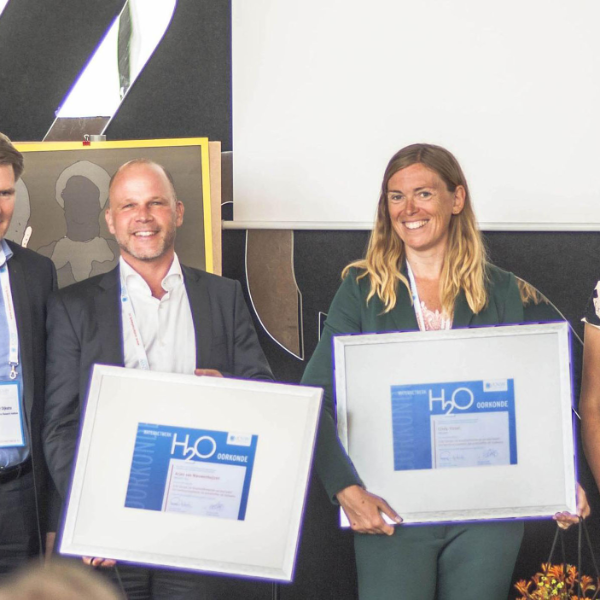Sustainability study wins H2O Award

Sustainability study wins H2O Award
At the spring congress of the Royal Netherlands Water Network (KNW) held on 1 June 2017, Arjen van Nieuwenhuijzen was awarded the H20 Prize for the best scientific article of 2016. Arjen’s contribution concerned the sustainability of reclaiming raw materials from wastewater. It had been co-authored with Cindy Visser (formerly of KNN Advies), Ingrid Odegard and Geert Bergsma (CE Delft) and Marina Sanders (formerly of Witteveen+Bos). The jury noted that an evaluation based on sustainability, rather than costs and technology, represents a new and innovative approach.
The prize, consisting of a cash amount and a testimonial, was presented by the chairman of the jury, Idshart Dijkstra of the KWR Watercycle Research Institute, and KNW director Monique Bekkenutte. Arjen van Nieuwenhuijzen’s submission was one of 69 entries. It won by virtue of ‘thorough and innovative research which is also of direct practical application’. The article was published in a later edition of H2O magazine.
Life cycle analysis of materials reclamation
The authors examined the extent to which reclaiming materials from wastewater furthers the aims of sustainability. At present, water companies can meet roughly 25% of their own energy requirement using the biogas that is produced as a by-product of the water treatment process. The aim is to increase this figure to at least 40% by 2020, with continued growth thereafter. Energy is one thing: wastewater can also contain many valuable resources such as phosphate and cellulose. This has prompted many water companies to convert their treatment plants into ‘Energy and Resources Factories’. To assess whether doing so is worthwhile in terms of sustainability, Witteveen+Bos, KNN Advies and CE Delft conducted life cycle analyses for a selected number of substances in a study commissioned by STOWA, the Netherlands Enterprise Agency, and EFGF (a networking platform for the water supply sector). The substances examined were phosphate, NEO alginate, PHA (polyhydroxyalkanoates, which can be used in the production of bio-plastics) and cellulose. Wastewater can contain many reusable resources, with phosphate and organic materials (biogas, PHA, alginate and cellulose) topping the list. The life cycle analyses concluded that all reclamation processes have some environmental advantage compared to conventional water treatment methods.